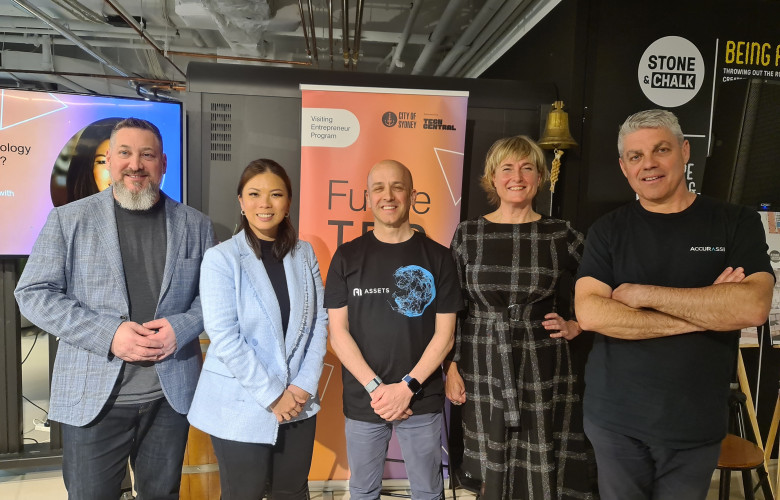Smart Cities, Property Technology and the Path to Sustainability
Contact
Smart Cities, Property Technology and the Path to Sustainability
Proptech Association Australia and Stone & Chalk co-hosted a special in-person event at the Sydney Startup Hub on Friday 24th June as part of the City of Sydney’s annual Visiting Entrepreneur Program.
Proptech Association Australia and Stone & Chalk co-hosted a special in-person event at the Sydney Startup Hub on Friday 24th June as part of the City of Sydney’s annual Visiting Entrepreneur Program.
The Proptech Panel was moderated by Stone & Chalk CEO Michael Bromley and featured visiting entrepreneur, Grace Sai, from Unravel Carbon in Singapore, to discuss smart cities and sustainability.
After a 15-year career building startup and impact ecosystems, leading a venture capital fund and influencing multi-sectoral collaborations, Ms Sai is determined to solve climate change.
The other expert guests on the panel were Wayne Herbert from AI Assets, Cecille Weldon from Weldonco, and Ross Sharman from Accurassi.
AI Assets was the winner of the award for “Most Innovative Proptech Startup - Smart Buildings & Cities” at the recent Proptech Awards.
Can property technology transform our built environment?
The panel’s starting point was that we did not build our cities with sustainability in mind and to consider whether property technology (“PropTech”) can transform them into smart cities for tomorrow.
According to the panel, smart cities start with smart homes with smart occupants. “There’s little benefit in having a 10-star house with a 1-star occupant,” said Ms Weldon. As such, there is an important role for consumer education around smart homes and their benefits such as liveability.
According to Ms Sai, the sustainable economy is estimated to be worth US$20 trillion, and will deliver the biggest impacts on energy, waste, water, and the built environment.
In addition to being sustainable, smart cities will be inclusive for people with a disability, cater for diversity, and enable connection via open data, such as Australia’s Consumer Data Right which can connect banking and energy data to enable consumers to make highly informed decisions.
Barriers to adoption of technology
The panel considered the barriers to adoption of technology, taking the example of electric vehicles and scooters. There are cost barriers, supply chain barriers, regulatory impediments, and a lack of infrastructure, impeding both the demand and supply of these energy-efficient modes of transport.
So is it a case of chicken and egg … or carrot and stick?
“Innovation is always ahead of regulation,” said Ms Weldon. “Good entrepreneurs know how to bridge those gaps,” she continued.
Mr Herbert added that: “One of the barriers is the human change aspect as the property industry is now seeing PropTech come to the fore.”
Mr Herbert noted that there is an exciting role for AI and robotics in smart buildings, enabling companies to have a better understanding of their fixed assets. AI Assets collects and analyses the data of large property portfolios. This permits modelling how and when to replace assets in their life cycle, including calculations of embedded carbon, although some assets will require a different approach. “You can’t stick a monitor on carpet,” he said.
Commenting on the role of government to provide incentives and to lead, Ms Sai said: “Governments have a responsibility to enable risk-taking in a responsible way by creating regulatory sandboxes and an environment that supports pilots and POCs without stalling the mothership. Singapore is really good at that, for example, the Monetary Authority of Singapore’s sandbox where entrepreneurs can experiment without permission or forgiveness.”
How can we make our cities smarter with ClimateTech?
The panel agreed that carbon offsetting should be the last option, not the first option, for achieving carbon neutrality. It’s better to work with carbon removal partners.
Mr Sharman commented that a smart building can use energy more efficiently and sustainably and that with energy costs increasing, the cost benefits of renewables are becoming more compelling. “Every home in Australia should have solar on it,” he said.
The panel agreed that the impact at the enterprise level is larger than at the consumer level. At the same time, the individual citizen can embrace their own agency and responsibility as a householder or housemate, an employee, and a voter.
“Be creative and have fun decarbonising,” advocated Ms Sai. “Doing it voluntarily rather than as a compliance task will allow us to move faster. We need decarbonising to be commonplace, rather than something people dread doing,” she concluded.
The Proptech Panel is a free monthly educational event hosted by Proptech Association Australia.





